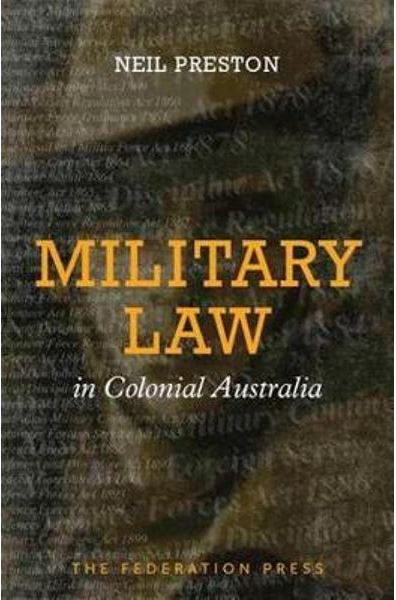The purpose of this work revealed in his earlier publication Military Law in The Twentieth Century – The Development of a Common Disciplinary Code was the first in what might have been a trilogy covering three eras of Military Discipline in Australia. The missing era being that between the early part of the twentieth Century apart from the new Disciplinary Code. It was not intended to be a history of the Australian Colonies armed forces rather, a survey of the disciplinary law governing those forces.

Neil Preston
The Federation Press, Annandale NSW 2016
Paperback 344pp RRP $89.95
Unleavened, the ennui threatened by exposure to a desert of bare legislation must have been a concern to the Author. Not for Neil Preston AM the recourse to the blunt remedy of the sensational modernists. Given the context and interdependence of the matters shaping any Disciplinary Code namely the type of Force to which it is to apply-in turn influenced by the circumstances extant at its raising and its intended use, allow of several very informative discourses used to enliven the narrative of his Survey. These include: A background of colonial events, both British and Local from which such law derived, Constitutional law, Defence history prior to 1854, Disciplinary Law applicable to British permanent and part time forces and a short survey of the development English law. Absent an existing compendium appropriate to purpose, it became necessary to research these matters from scattered sources.
A section on Meaning of Terms Used is more than a dictionary, drawing attention to the multiple meanings of what might be termed idioms as militia, volunteer, regular still in common use. On the other hand, the use of a non-capitalized letter of Proper Nouns despite logical argument and referenced authority justifying the practice may be more problematic for some readers.
The recognition that ideally, coverage of the operational effect of the Codes in practice would have been warranted but dismissed on grounds that the book would not have been finished if the serious research required by that task had been undertaken.is not an unacceptable rationalisation by the author who at the time of the publication of his earlier work in 2006 was 81.
In my view Neil Preston (who might fairly be described as one of the Fathers of the Common Disciplinary Code after 15 years on the working committee responsible for the legislation) clearly succeeds in his purpose. Ultimately, by providing a unique and scholarly reference source, thoroughly enriched by the perceptive insights in the fulsome appendices and footnotes.
Reviewed for RUSI by Paul Willie, January 2019
Contact Royal United Services Institute about this article.






